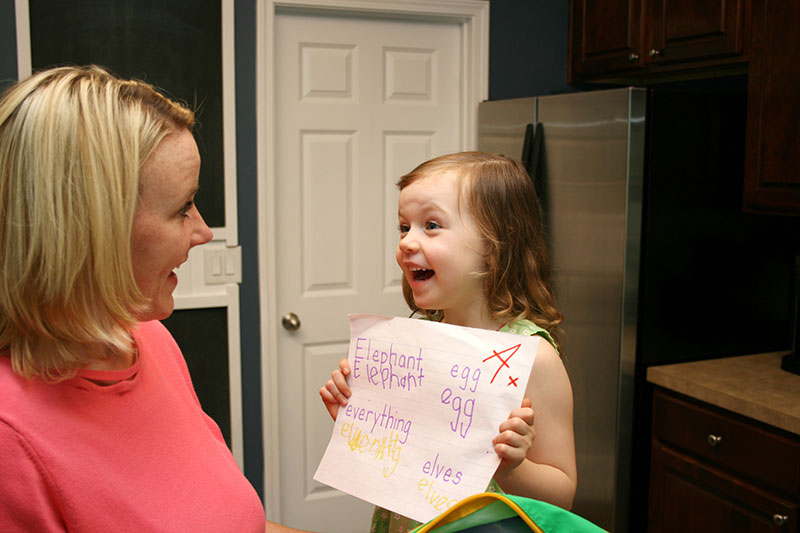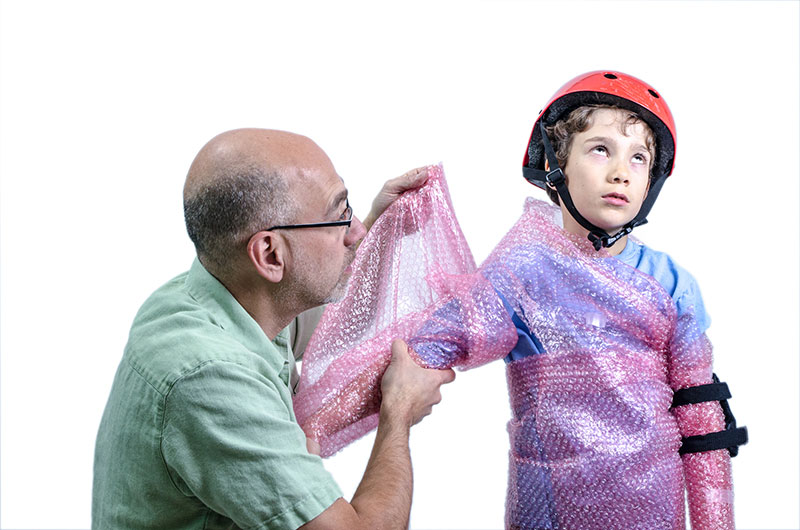Every generation of parents loves their children and searches for the best ways to support them and prepare them for a successful start in life. Modern parents, however, often take this effort to extremes, complicating their children’s lives (and their own, just as much) in an attempt to clear a perfectly smooth path for their still-uncertain steps.
Among the many shades of modern parenting styles, one stands out in particular—the so-called “snowplow parent.” The term is both new and vivid, describing a type of parent who works tirelessly to remove any obstacle from a child’s path.
My first encounter with this striking concept instantly brought back two half-forgotten memories from my own childhood.
The first was Mara, a little girl I had almost become friends with during preschool, when we both attended one of the three kindergartens in our village. But every time I went with her to school, we arrived terribly late, because Mara already had her own routines—or rather, her own rituals. It took angelic patience to wait for her to get ready, even though her “preparation” consisted mostly of approving or rejecting, with great weariness, the endless stream of offers from the army of parents, grandparents, aunts, and uncles bustling around her.
Minutes melted away as Mara, perched like a tiny sultan on a throne of pillows, debated whether she preferred vegetable spread or butter with honey—or maybe just plain butter. Unless, of course, sour cherry jam would be better. Or strawberry. Perhaps plum. While the offers and pleas for her breakfast poured in, I already knew that choosing her snack for kindergarten would require another round of deliberation, and that picking out her outfit would be no easier.
The adults, for their part, never seemed to tire of this morning ordeal—at least not visibly. I’m sure they must have envied Mara’s starring role now and then, while mine was decidedly humbler. Looking back now, though, it’s hard not to see how clearly her parents fit the mold of “snowplow parents,” constantly at work clearing every obstacle—academic, emotional, or material—from her path through life.
The second image that came to mind was that of the snowplows themselves—tools so familiar from my childhood (and not only then). Anyone who has lived in a mountain region knows just how precious a snowplow can be during the long winter months. I grew up in such a place, where the snow sometimes fell for three days and three nights, like the royal weddings of old fairy tales, and where the blizzard could easily cut off access to the nearby town or neighboring villages, turning the main road into a soft, white desert—one you’d be unwise to cross alone.
The village lanes would also vanish under snowdrifts, and back in the days before snowplows could clear everything in minutes, it was the villagers’ strong arms and sturdy shovels that dug them out—often several times during the same snowfall. Their work left behind a ready-made track for our noisy sledding sessions and open paths to the little school that awaited us each morning with crackling fires in its stoves and frost flowers blooming on the windowpanes.
It might seem convenient to go through childhood with overprotective parents—the kind who dutifully clear every possible obstacle out of your path before you even notice it’s there. And since, by definition, parents want what’s best for their children, such a role can feel perfectly natural whenever their vigilance tells them it’s time to step in for the sake of their child’s happiness or success. But while children grow up, the obstacles never really disappear—which means a “snowplow parent” can never truly relax.
Sometimes, the distance between this kind of good intention and a headline-making decision is only a single step—one that can easily become a leap into the void without a safety net.

“Varsity Blues,” or how bribery bought excellence
Thirty-three parents in the United States were charged with fraud after paying between $200,000 and $6.5 million to secure their children’s admission to some of the country’s most prestigious universities, including Yale, Stanford, and the University of Southern California. These weren’t ordinary parents, but real estate investors, corporate executives, prominent lawyers, and even Hollywood actresses—all determined to see their children enrolled at elite institutions, no matter the cost.
Investigations revealed a well-organized scheme run by William Singer, a college admissions consultant from Newport Beach, California, that also involved bribed college coaches willing to falsify admissions tests.
In several cases, Singer advised parents on how to have their children falsely diagnosed with learning disabilities during psychological evaluations—allowing them to take their exams at special centers where proctors were paid to turn a blind eye to the cheating.
In other cases, students were presented to universities as accomplished athletes—talented football or tennis players—with Singer fabricating achievements, trophies, and even photographs to support the claims.
According to prosecutors, some of the students admitted to these top universities knew their admission had been secured through fraud, while others were left by their parents to believe their success was the result of their own academic performance.
For $500,000, actress Lori Loughlin and her husband, fashion designer Mossimo Giannulli, secured their daughters’ admission to the University of Southern California as members of the school’s rowing team. The application file prepared by Singer claimed the girls were competitive athletes with genuine accomplishments in the sport.
Loughlin turned herself in to authorities, and a judge set her bail at $1 million—the same amount required for her husband. Following the scandal, the couple’s daughters chose to withdraw from the University of Southern California. In addition, Hallmark Channel and Netflix announced they were ending their collaboration with Lori Loughlin following her arrest on charges of mail fraud.
Actress Felicity Huffman was also charged with bribery in connection with altering the results of the SAT, a standardized test used for college admissions. Huffman has been prohibited from leaving the United States, and her bail was set at $250,000.
“These parents are a catalogue of wealth and privilege,” says prosecutor Andrew Lelling, emphasizing that “there can be no separate college admission for wealthy, and I will add there will not be a separate criminal justice system either.”
USC students expressed frustration and disgust over this kind of arrangement. “This shows us where we are as a society,” engineering student Natalia Parraz says. Meanwhile, Romil Audhkhasi, a student from India, noted that while corruption—including in education—is common in his home country, it was shocking to see it happening in the United States. He added that the situation is “unfair to other students who got in honestly and by working hard.”
The real victims of this scandal were the qualified applicants who were shut out of prestigious universities, FBI special agent Joseph Bonavolonta says.
“Make no mistake, this is not a case when parents were acting in the best interest of their children,” Bonavolonta says. Of course, the defendants might dispute that, convinced they belong precisely to the category of parents who do everything possible to set their children up for success. And they are far from the only ones who think that way.

A perfection justified by shared DNA
The practice of buying one’s way into top universities is hardly new, says Daniel Golden, author of The Price of Admission: How America’s Ruling Class Buys Its Way into Elite Colleges—and Who Gets Left Outside the Gates.
In many cases, the admission of wealthy Americans’ children has been secured through massive donations to coveted universities. What remains unclear is why the parents involved in the “Varsity Blues” scandal chose to break the law rather than follow the long-established donation route. Perhaps bribery seemed the cheaper option—or maybe they had been told their children’s lack of qualifications was too obvious to be offset even by large donations, Golden says.
In this tangled puzzle, journalist Emma Brockes believes she can discern one clear element—something she recognizes from her own experience as a parent. It’s the focus of an article she published in The Guardian, pointedly titled: “My kids are genuises. Honestly. Who do I pay the bribe to?” The piece is not an attempt to excuse those involved in college admissions fraud, but rather an honest exploration of the modern parent’s tendency to project expectations of excellence onto their children.
Brockes believes she can understand how some parents ended up crossing the red line of ethics and legality. Parents are often quick to rationalize fraud—they might think that, although their child is very capable, they don’t perform well under stress and could therefore miss out on admission. Or perhaps they believe their child’s intelligence is of a kind that standardized tests fail to measure. For wealthy parents, there may even be a sense that unless they bend the rules a little, they can’t compete with the privileges of the billionaire class.
On one hand, every parent is convinced their child must be (almost) perfect. As Brockes wryly says, the lies we tell ourselves about our children’s brilliance are only half lies: “My daughter’s ability to hold on to the term ‘solar system’ and observe that ‘the mouth and nose are connected’ is evidence of Einstein-like acuity.”
On the other hand, parents find it difficult to watch their children fail, Brockes says. Any parent would rather let their child win a game—and that’s partly, she says, a matter of laziness. With small children, it’s easier to let them win than to deal with their frustration when they lose. As they grow older, however, it becomes not only about parental pride but also about a sense of duty—not wanting to stand by and witness a failure that could be prevented or rewritten. This might explain why some of the parents involved in the admissions scandal chose to shield their children from a painful truth: that they simply weren’t qualified for a top university.
We cannot get everything we want—and it is certainly unethical to try to achieve it through shortcuts—but this truth seems hard to accept for parents who believe their role, as any “good” parent’s role, is to remove every obstacle from their child’s path. Most will never bribe teachers through illegal schemes to secure admission to elite universities, but they will still try to expose their children only to the bright side of life—though the results are not always what they intend.
The mechanics of “snowplow” parenting
Examining several parenting styles, education expert Richard Rende says that “snowplow” parents, much like “helicopter” parents, cross the boundaries that should exist between parent and child. While helicopter parents try to control the environment and experiences their children are exposed to, snowplow parents see it as their duty to remove every possible obstacle from their child’s path.
“Requesting that a specific child not be in your child’s class is one thing; demanding to review and approve the class roster is quite another,” Rende says.
According to Rende, a snowplow parent struggles to recognize—and even more to correct—their constant intrusions into their child’s life.
This behavior often begins very early—sometimes even before the child is born, when parents are already putting their unborn baby on the waiting list for a prestigious preschool.
In an increasingly competitive world, a parent’s desire to maximize their child’s chances of success is understandable, Rende says. However, he also points out the other side of the coin: a child who is never allowed to handle age-appropriate challenges may grow into an adult who struggles to make decisions with confidence.
Parental involvement in a child’s schooling does not always lead to academic success—a surprising conclusion reached by sociologists Keith Robinson and Angel Harris. Analyzing American families over three decades (1980–2000), the two researchers found that common parental behaviors—such as helping with homework or contacting teachers to inquire about a child’s behavior—do not necessarily improve academic performance. In some cases, they may even correlate with poorer results.
Based on their findings, Harris and Robinson concluded that a parent’s true role is to convey a consistent message about the importance of education in their child’s life: “They should set the stage and then leave it.”
“Parents who swathe their children in protective bubble-wrap” may actually be fostering anxiety, says Graham Davey, a professor at the University of Sussex, UK. Davey cites research by psychologist Ron Rapee, which found that overprotective parents tend to be overly involved even during simple activities, such as doing a puzzle with their child. The parental intention is to reduce stress, but the study shows that excessive involvement increases a child’s vulnerability to anxiety, undermines their ability to manage challenging situations, and encourages avoidance.
A child’s attitude toward obstacles can be shaped by whether a parent focuses primarily on the child’s traits or on their progress. Carol Dweck, a psychology professor at Stanford University, has spent decades studying how parental language and behavior influence the development of children’s mindsets.
Dweck found that some children come to believe their abilities are fixed and cannot be changed—a “fixed mindset.” Others, however, adopt a “growth mindset,” seeing failure as something that can be overcome because success follows effort. When parents habitually praise their child’s traits, they reinforce a fixed mindset, in which failure is viewed as confirmation of personal limitations. Conversely, when parents emphasize progress, they foster a positive attitude that links success to hard work and treats failure not as a verdict but as a sign of insufficient effort.

A race that’s hard to step out of
Through modern technology, “snowplow” parents have managed to insert themselves even onto college campuses, says Carolyn O’Laughlin, director at Sarah Lawrence College. Once there, they often can’t resist getting involved in every detail of their now-grown child’s life—trying to persuade professors that grades were unfair, requesting lists of ingredients in cafeteria salads, or stepping into roommate disputes to investigate the mysterious disappearance of a jar of peanut butter.
Overprotective parents don’t ease up even when their children become adults, according to a survey conducted by The New York Times and Morning Consult. The survey found that 76% of parents had reminded their adult children about a deadline, 74% had made appointments on their behalf (such as scheduling a doctor’s visit), and 11% said they would contact their child’s boss if the child faced problems at work.
It’s hard to break the habit of clearing obstacles from a child’s path—but if you don’t stop in high school, you won’t stop in college or beyond, says Julie Lythcott-Haims, former student counselor at Stanford University.
“You have manufactured a role for yourself of always being there to handle things for your child, so it gets worse because your young adult is ill-equipped to manage the basic tasks of life,” Lythcott-Haims says.
There will always be snowstorms in an adult’s life, no matter where they are in the world, O’Laughlin says. The best a parent can hope for is to have placed a snow shovel in their child’s hands.
As Lythcott-Haims puts it, “the point is to prepare the kid for the road, instead of preparing the road for the kid.”















